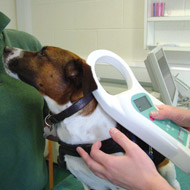What the microchipping law means for nurses

New microchipping rules are coming into force on 6 April, 2016.
On 6 April, 2016, dog microchipping will become compulsory in England, Scotland and Wales. In advance of the new law, some changes have already been made to the rules on implanting. To help ensure nurses are up-to-speed, BVNA has issued a statement.
New government regulations came into force on 24 February, 2015. They state that no person may implant a microchip in a dog unless:
- They are a veterinary surgeon, or, a veterinary nurse acting under the direction of a veterinary surgeon
- They are a vet student or vet nursing student acting under the direction of a veterinary surgeon
- They have successfully completed a training course approved by the secretary of state
- They received training on implantation (including practical experience of implanting a microchip) prior to the date on which these regulations came into force
The current veterinary nursing qualification and occupational standards do not go into the same depth of knowledge and understanding as the new qualification, therefore VN training alone is not considered sufficient under the new rules.
BVNA reminds RVNs that in order to be deemed competent by the RCVS code of conduct, they must be able to provide evidence of the microchip training they have attended, or they should update their skills.
It also stresses that RVNs are regulated and accountable professionals; any individual who does not feel competent should not undertake microchipping without further training.
For more information from the BVNA, visit: http://www.bvna.org.uk/advice/bvna-position-statements



 The RCVS has announced a new version of its 1CPD mobile app, with enhanced features for veterinary surgeons and veterinary nurses to record their continuing professional development.
The RCVS has announced a new version of its 1CPD mobile app, with enhanced features for veterinary surgeons and veterinary nurses to record their continuing professional development.